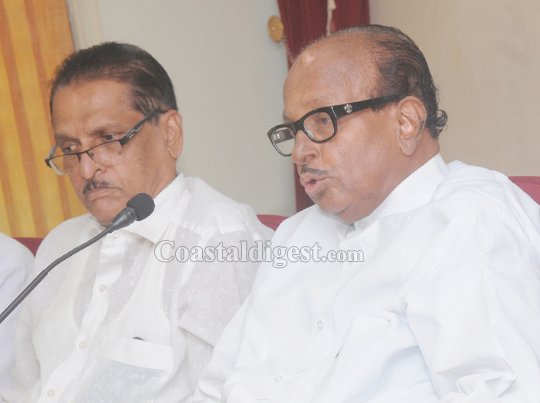Mangaluru, Sep 6: Continuing tirade against Karnataka chief minister Siddaramaiah, sidelined Congress veteran B Janardhana Poojary on Tuesday held the former responsible for the the Supreme Court's direction to the state government to release 15,000 cusecs of water to Tamil Nadu every day.

Addressing reporters here, he said the negligence by the state government in filing a proper affidavit led to this situation. “The chief minister?has wasted time by convening an all-party meeting and a meeting of experts. The decision to file an affidavit needs common sense and not an expert advice. The chief minister, being an advocate himself, has committed an act of ignorance. He must have gone through the affidavit,” he said.
Mr Poojary demanded the resignation of Major and Medium Irrigation Minister M. B. Patil for “his failure to present the State's stand properly before the Supreme Court in the Cauvery row.”
Mr. Poojary said the Chief Minister should ask Mr. Patil to resign for his conduct. “Do not try to protect such Ministers,” he said. He rebuked the CM for allotting some important portfolios to “undeserving legislators.”
Mr Poojary also questioned why the contract for irrigation works are being given to the people outside Karnataka. He said there is no water in Cauvery belt and there is a possibility of releasing water to Tamil Nadu from rivers in the coastal region. This will be a blow to the farmers in the region, he stated.
Due to Yettinahole project, Dakshina Kannada will become a barren land. I have been warning the state government on the adverse effects of thge project. Though the high command has asked the chief minister to speak to him on the issue, he has not done so till now, he said. Responding to a query, he said he will support the protests over the Cauvery issue, but not the bandh.





Comments
(by the way i am not a supporter of any corrupt political party this is just my observation ) now congress has to throw out all these old , useless, rejected, ....... like oscar fernandez , and janardhana poojary , they are the ones responsible for the down fall of congress and they are the ones who were playing dirty politics within the congress ,
being mps for several times they have not done any development of our districts.
even they are not allowing and promoting young and honest(not completely honest) leaders in to politics.
Ha Ha Ha.. Poojarlu bring some new leaders to fill 4 chairs.
The old chair persons are no more now.
Coastal digest team..dont go for Poojari press conference...Bogaluva naai kachodilla..by attending his press conference your report losing Petrol price..nothing is going to gain..
Add new comment